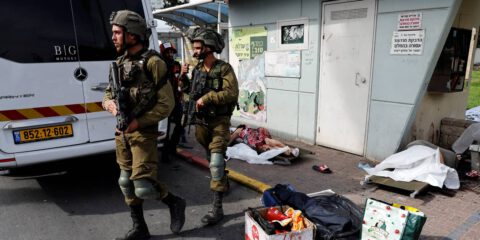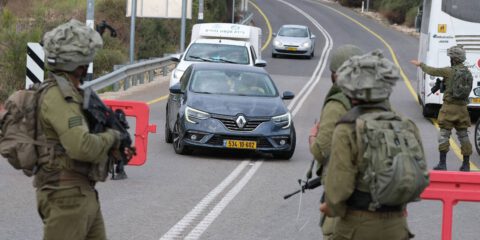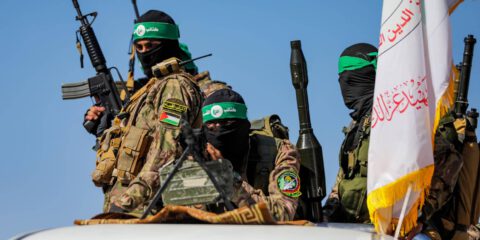With Operation Shield and Arrow in Gaza over, Israel must again focus on the challenge of Iran as a top priority. Given the urgency, now conveyed even by the US administration, the government must accelerate efforts to derail Tehran’s nuclear project. It is not the time to seek a defeat of Hamas or the collapse of the Palestinian Authority, but rather a continuation of conflict management. Israel should restore (albeit not fully trust) security cooperation with Ramallah, in the context of the process launched in Aqaba in late February; and in Gaza, to drive further the decoupling of Palestinian Islamic Jihad, an Iranian proxy, from the Hamas de facto government.
While Israel was preoccupied with Operation Shield and Arrow (May 9-13), the US administration took an alarming position regarding the status and achievements of Iran’s military nuclear project. Testifying before the US Senate Subcommittee on Defense Appropriations on May 11, Secretary of Defense Lloyd Austin and Chairman of the Joint Chiefs of Staff Mark Milley raised the level of concern over the speed in which Iran is progressing toward possessing enough fissile material for a nuclear bomb. Milley spoke of “less than two weeks” from the moment of decision by the Supreme Leader and “several more months” to produce a weapon.
Although they reiterated the US commitment never to allow Iran to have the bomb – and notably did not mention the qualifying phrase “a ‘fielded’ nuclear weapon” – the Israeli leadership cannot safely assume that this sobering assessment will translate into effective American action. While the US may be boosting its military posture in the Gulf, it will be Israel’s “freedom of action” (a phrase recently used in this context by US National Security Adviser Jake Sullivan) that may be tested in the not-too-distant future.
The implication for Israeli strategic priorities is quite clear. While it is tempting to seize the present opportunity and seek “decisive outcomes” (Hebrew: hachra’ah), such as the destruction of Hamas rule in Gaza and the enfeeblement and possible collapse of the PA in Ramallah, this would be the wrong time to do so. Israel cannot achieve such an outcome without a prolonged and extensive investment of forces, resources, and attention. Moreover, the intangible costs of international legitimacy and US backing may run very high. To be locked into such an open-ended prospect is to risk the loss of the freedom of action toward Iran that the US now seems ready – or at least theoretically willing – to grant Israel.
Hence the need to return to the basic concept of conflict management, to be applied flexibly and as circumstances allow. Obviously, there can be no surrender to the type of outrageous demands raised by PIJ during their negotiations (with Egypt and indirectly with Israel) for a ceasefire, such as an Israeli pledge to desist from targeted killings and the cancellation of the traditional Flag March on Israel’s Jerusalem Day (May 18 this year). However, neither was it in Israel’s interest to prolong and expand the conflict. The government’s choice to accept – and publicly praise – the Egyptian mediation effort was the right decision under the circumstances, as far more critical, demanding, and dangerous challenges lie ahead.
In Gaza: Decoupling Hamas from PIJ and restoring deterrence
The most salient aspect of the recent two “rounds” against PIJ – Breaking Dawn in 2022 and now Shield and Arrow – has been the decision by Hamas to stay out of the fray. Israel did its part by avoiding as much as possible any action that could drag in Hamas – bearing in mind that a full-scale confrontation with Hamas, such as operations Protective Edge in 2014 and Guardian of the Walls in 2021, could be much longer and costlier in blood and material losses.
This apparent decoupling can be plausibly interpreted (and therefore dismissed) as a deliberate charade and scheme by Hamas – which has ultimate say in the Gaza Strip – to have others do the dangerous work of shedding Israeli blood, while Yahya Sinwar and his colleagues do not suffer the consequences. Based on this interpretation, there have been voices in Israel arguing that Hamas, not PIJ, should have been penalized for the escalation of attacks.
That argument should not be entirely dismissed. Indeed, at some future point of decision – if Israel were to come to a long-term hudna, or armistice, with the de facto government in Gaza (as UN reports describe Hamas) – the dismantling of PIJ as an independently armed organization should be on the agenda. After all, monopoly on the use of force is the most elementary definition of governance.
Still, looking at PIJ as a shill for Hamas is far too simplified. There are three significant differences between them, and all have implications for Israel’s options in conflict management:
- Having been in power in Gaza for the last 16 years, Hamas has become the de facto government – with all that this implies regarding its responsibility for the survival and (minimal) well-being of some two million people. Israel can thus exercise or threaten significant economic sticks and perhaps offer some carrots to induce Hamas to avoid being drawn into violence. PIJ can ignore issues such as energy and water and the access of Gazan breadwinners to the Israeli labor markets. Hamas cannot.
- For much the same reason, Hamas has no choice but to rely on Egypt and take Cairo’s messages into account. There is no love lost between Sisi’s regime and a Muslim Brotherhood-oriented movement, such as Hamas, but both need each other. Egypt wants a quiet border, and Hamas needs access to the world that does not go through Israel. Egypt has ways of bringing her influence and clout to bear. The Qataris may come in with the bags of money, but the Egyptians – who talk to all sides but whose main leverage is on Sinwar – must remain in the lead at the strategic level.
- Most importantly, PIJ is a wholly owned Iranian proxy – although Sunni, not Shi’ite – and, in essence, an arm of the Islamic revolutionary “octopus” (alongside Hezbollah in Lebanon, the Houthi regime in Yemen, many of the Popular Mobilization Forces in Iraq, and subversive elements in the Gulf and beyond). On the other hand, Hamas is a Muslim Brotherhood offshoot, a different branch of totalitarian Islamism. In the early days of the civil war in Syria it had a falling out with Iran and supported the opposite side. But as Asad’s regime drifted back into legitimacy, this quarrel became less acute. Hamas may thus work closely with the Iranians, but not for them.
All this might make a significant difference for Israel if an all-out confrontation with Iran were to break out. Hezbollah in the North is almost sure to come in – after all, that is why it has been nurtured and armed by Iran all these years – and PIJ may try to do so again. But under such circumstances, dissuading Hamas from opening another front (and prevailing upon them to restrain PIJ actions) would ease the burden on the IDF and the Israeli civilian population under missile attacks. It is thus in Israel’s interest – again, in the context of conflict management, at this stage – to deepen the isolation of PIJ and consolidate Hamas’ reluctance to be mauled in a battle that serves Iran’s goals, not its own.
With the PA: Back to the Aqaba format
Similar considerations drove Prime Minister Benjamin Netanyahu to authorize his national security adviser, Tzachi Hanegbi, and senior Israeli officials to participate in what was described as an “emergency conference” in Aqaba, convened by Jordan and promoted by the Biden administration. Given the US position on the Palestinian question, Netanyahu took a calculated risk: the Aqaba conference established an ongoing forum where Israel might find itself isolated. But this concern was mitigated by setting clear terms of reference, entirely focused on restoring some calm and channels of dialogue between Israel and the Palestinian Authority rather than upon long-term aspects of the permanent status negotiations.
Moreover, both Jordan and Egypt – even more so than the US – have a vested interest in avoiding a deterioration toward all-out conflict (as both countries demonstrated in the Gaza crisis). They share, in effect, the goals of returning to conflict management, restoring (at least to some extent) security cooperation with the PA, and restraining Hamas. That made Israel’s participation worthwhile.
An understanding reached between Israel and the Biden administration over settlement construction preceded the meeting in Aqaba. Jordan formally convened the conference (February 26) and reiterated its warnings against rising tensions, which were also raised during Netanyahu’s meeting with King Abdallah II in Amman (January 24). However, in practice, this was a US-driven initiative based on ideas broached by Secretary of State Tony Blinken in Israel (January 30) and on the understandings reached ahead of the UN Security Council debate (February 20). To persuade the UAE to pull its draft condemning Israeli policy, Netanyahu was willing to consider limitations on construction in Judea and Samaria – a controversial position within the governing coalition and yet an essential part of the effort to find common ground with the US and with others in the West and the region.
The meeting was attended, on Israel’s part, by Hanegbi, head of the Shin Bet Ronen Bar, Director General of the Foreign Ministry Ronen Levy, head of the Politico-Military Division at the Defense Ministry Dror Shalom, IDF Coordinator of Policy in the Territories Maj.-Gen. Ghasan Alyan – together forming the very core of the Israeli defense establishment – and their assistants. The Palestinian delegation – whose participation raised the ire of Hamas and even of elements in the ranks of Fatah, was led by Secretary of the PLO Executive Committee Hussein al-Sheikh (a veteran interlocutor of the Israeli side), Preventive Security Service Director Majd Faraj, and Mahmoud Abbas’ foreign policy adviser, Majdi Khaldi. Egypt was represented by Director of the General Intelligence Directorate Abbas Kamel – who regularly conducts dialogue with the factions in Gaza – and Jordan by his counterpart, Director of the General Intelligence Department Ahmed Husni, alongside Foreign Minister Ayman Safadi. National Security Council Coordinator for the Middle East Brett McGurk, Assistant Secretary of State Barbara Leaf, and Special Representative for Palestinian Affairs Hady Amr led the US mission.
As indicated above, it was quickly made clear that the meetings – first in Aqaba and subsequently in Sharm el-Sheikh (March 19) – would not be drawn into a fruitless discussion of permanent status issues. The Palestinians did put forward a long list of demands, some related to a drastic change in the pattern of Israeli incursions into Palestinian cities (following some violent clashes in Jenin and Nablus) and others regarding the longer-term, such as the status of Jerusalem. However, all other participants made it clear that it was not practical to discuss this list under the present circumstances, and the meeting should concentrate on practical matters and measures to prevent the accelerating violence on the ground.
The Aqaba Joint Communique put forward by the State Department affirmed a mutual commitment to the existing agreements (a first mention for the present Israeli government, where many revile the Oslo Accords), to the quest for peace, and de-escalation. With a nod to Jordanian concerns, all participants affirmed the status quo of the holy places in Jerusalem.
Both Israel and the PA undertook to avoid unilateral actions – including an Israeli commitment not to discuss the establishment of new settlements over the following four months nor legitimize existing outposts for six months – a controversial clause that the prime minister later interpreted in a manner that seemed to negate it, or at least exempt from it the decisions already taken.
Further confidence-building measures were envisioned, though not specified. But the group’s meeting – and resolve to continue to meet – was itself hailed as a breakthrough: there had been no high-level negotiations since 2014. All participants thanked Jordan for hosting the meeting and the US for its indispensable role.
Reactions in Israel – and the rationale for conflict management
Not surprisingly, the text and the following steps raised sharp criticism from within the governing coalition, some quite blunt (“What happened in Aqaba stays in Aqaba”). There were procedural reservations raised, as the specifics were not brought up in a cabinet discussion, as well as two substantial warnings:
- The PA cannot be a partner for progress toward peace, given its basic positions and its ambivalence toward terror. Its duties under the agreed texts are rather vague. Brutal terror attacks – including in Huwarah on the very day of the Aqaba meeting, when two Israeli brothers were shot to death – demonstrate the inability and unwillingness of the PA to do much about it (Hamas, it seems, deliberately sought an escalation to derail the conference, and described the PA attendance as an act of treason).
- Israel may find itself under pressure on the fundamental questions of the permanent status agreement, on which the position of Biden’s team is well-known: support for the Two-State Solution based on the 1967 lines. Israel’s willingness to take part in a project put together by the US, Egypt, and Jordan in coordination with each other could potentially lead to diplomatic isolation. That is why previous governments preferred to avoid such a diplomatic trap and not respond to similar American initiatives in recent years.
These are cogent arguments. Under different conditions, they would have carried the day. But by early 2023, Israel found itself at a point of decision: to join the US/regional initiative, despite its weaknesses and dangers, or to slide rapidly – amid a crisis at home – toward a large-scale confrontation in Judea and Samaria. That, in turn, would very likely lead to the collapse of the PA. Indeed, there are voices in Israel – even within the governing coalition – who may hope for such a hachra’ah (decisive outcome), which could at long last rid Israel of the baneful results of the Oslo process and could constitute a “victory” in the long twilight struggle over Palestine. That would be, as they see it, a better option than continuing the status quo, under which the PA offers little more than minimal security cooperation, pays stipends to terrorists and their families, and regularly engages in anti-Israeli diplomatic warfare and virulent propaganda.
Such a decisive change of course – abandoning conflict management and actively pursuing the ruin of the PA – should only be undertaken if and when Israel enjoys broad support internationally and stable backing at home, and would thus be free – in terms of its national strategic priorities – to deal with the consequences. As things stand now, these are bound to involve a long and painful IDF deployment in a thankless effort mission to impose Israeli authority and sustain services in densely populated areas. The diplomatic fallout will be severe, including the prospect of a head-on confrontation with the US administration. All this could play into the hands of Hamas, and Iran and its local proxies; and as the conflict in Judea and Samaria unfolds, we are likely to face the resumption of hostilities in the South (without the almost automatic American backing Israel has enjoyed in previous rounds).
Back to “Iran first”
Such a sequence of events would undoubtedly deflect Israel from what should be its overriding concern with Iran’s nuclear challenge. As US and Western concerns intensify – reflecting the acceleration of uranium enrichment as described above – Israel’s uppermost interest is to tighten US-Israeli military cooperation at the operational level (as demonstrated during exercise Juniper Oak 23-2 at the end of January), while at the same time retain the strategic freedom of action when necessary. In his own words, this has been Netanyahu’s priority since taking office (before he was distracted by the battle over judicial reform) and should remain so now.
For this to happen, Israel must return to the framework of conflict management with the PA and resume work within the Aqaba format, despite its difficulties. Possible CBMs –Confidence Buiding Measures – can be identified, and Israel should be willing to offer, as a gesture, to postpone (not abandon) the timetables for construction plans in the settlements. It would ignite controversy at home, but the alternatives are more problematic.
Looking further ahead, the direct dialogue with the Palestinians who lead their side in these conferences – and particularly with Majid Faraj and the security forces – could help Israel prepare (again, with some American backing) and build tools of influence for the day after Mahmoud Abbas when a fierce struggle for the succession will arise. Israel cannot determine the outcome but can have an impact on it.
At the same time, both at the multilateral table and in the parallel strategic engagement with the US, Israel should stand firm on some fundamental issues:
- The US should abandon plans to reopen a consulate in Jerusalem – which would be the exact opposite of a Confidence Building Measure from Israel’s point of view. It would feed false Palestinian hopes, revive the problematic list presented in February in Aqaba (primarily focused on Jerusalem), and derail the prospects of progress on practical matters.
- In the same spirit, it must remain clear (as recent patterns of action demonstrate) that Israel retains the right to act against terrorists, based on timely intelligence, even in Area A – at least until the PA security forces prove to be more effective in Jenin and Nablus than they have been so far.
- Jordan’s positive contribution is essential, not least because of the common interest in maintaining the status quo in Jerusalem. Still, against the background of recent events (such as the arrest and then transfer to Jordan of a Jordanian MP caught smuggling weapons), it is time to posit a legitimate demand – in “the spirit of Aqaba” – to change the poisonous anti-Israeli atmosphere in the Jordanian street.
Above all, the strategic dialogue with the US must remain decisively focused on enhancing cooperation in the face of the worsening Iranian challenge, while securing and maintaining Israel’s freedom of action – which ultimately serves US interests, not least because it reminds the world that it must take action, and soon.
JISS Policy Papers are published through the generosity of the Greg Rosshandler Family.
Photo: IMAGO / APAimages / Atia Darwish









 - בניית אתרים
- בניית אתרים